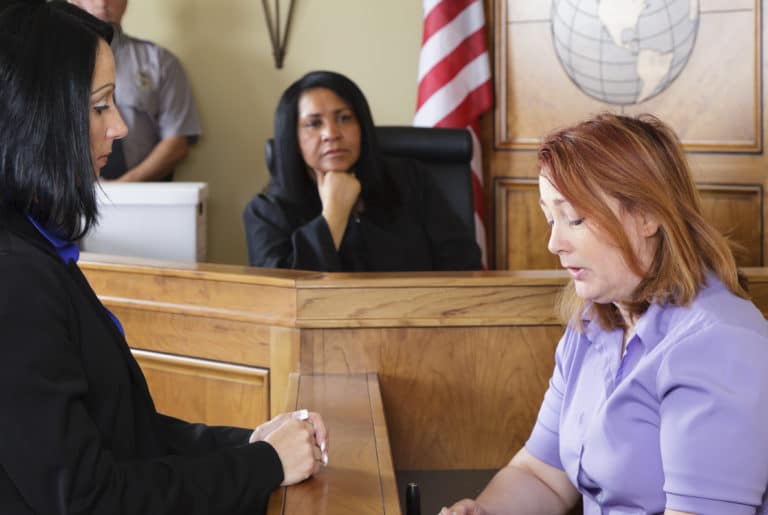Victim’s Rights: What Are They and How Do They Work?
The following content is adapted from “Unthinkable” by attorney Kyle Bachus.
When it comes to the criminal justice system, victims and family members of victims often feel the system favors the accused. Many victims have voiced their opinions about this imbalance, which has pushed for victim’s rights reform that would give them specific protections. Over the last few decades, there has actually been progress on this front.
Here’s what you need to know about victims’ rights, including what they are and what they mean for victims and their families during criminal trials.
Who Qualifies as a Victim?
Before discussing victims’ rights, it’s essential to understand who is considered a “victim” under the law. The consistent definition across most states includes:
- The person who the crime is committed against
- If the victim is a minor, the parents or legal guardians are also victims
- If the victim has died, the immediate family members are considered victims
- If a catastrophic injury leaves the victim incapacitated, a designated or appointed person is also a victim
However, others may feel they are a victim when it comes to a crime. Even with these restrictions, you can still file an appearance with the criminal court to be afforded victim’s rights under your state’s law. They will tell you if you don’t qualify, but it doesn’t hurt to be proactive.
What Are the Goals of Victim’s Rights?
In general, there are four primary goals of victims’ rights laws. These goals are intended to ensure crime victims are given the opportunity to:
- Be informed
- Be present
- Be heard
- Be supported
These rights apply throughout the criminal justice process, including the crime investigation, trial, and parole. However, it’s important to note that these rights do not give victims any power to make decisions or formal control within the criminal justice system. Victims do not have a say over whether charges are filed, what charges are filed, or how the case is tried.
Victim’s Right to Be Informed

Although victims don’t have control over decisions the prosecutor makes, they do have the right to be kept informed of the prosecutor’s decisions. Victims have the right to be notified of these steps during the criminal justice process:
- When (or if) a case is opened and what the charges are going to be
- The name, address, and telephone number of the lawyer responsible for prosecuting the case
- The internal case file number
- The courtroom to which the case is assigned
- Whether a warrant has been issued for an arrest
- If the prosecutor determines that charges originally brought by the police are unfounded, or chooses to reduce or decide to pursue some but not all of them
- Whether and when the accused will be released from jail or get their bail reduced
- The opportunity to provide a written victim’s impact statement to the prosecutor detailing how your loss has affected the family
- The time and place of every critical stage in the process and whether you have a right to be present and heard
- The opportunity to speak with the prosecutor before a case is plea-bargained and the right to be informed of the terms
- In some states, the opportunity to a copy of the pre-sentence report, which details the defendant’s prior record
- The opportunity to consult with the prosecutor following a conviction about what the family wishes the sentence to be
- When and where sentencing is going to occur and your right to be heard before the sentence is issued
- The opportunity to request a hearing on the appropriate amount of restitution
Remember, it’s always a good idea to be proactive and let the prosecutor know your willingness to be involved. If you don’t hear from them, you’re within your rights to reach out and request a meeting. The prosecutor’s office must adhere to its obligations to keep the victim informed.
Victim’s Right to Be Heard
Victims have the right to address the court during the criminal case’s sentencing phase. This right gives you a seat at the table and allows your story to be heard. It’s an opportunity to explain how the crime has impacted your family and what punishment or sentencing you feel is appropriate.
Ultimately, you may disagree with the judge’s decision. You may not feel like justice has been served. But exercising the right to address the court means you did everything within your power to get the best result for your family.
Filing an Entry of Appearance
You can also let the judge know that you’re the victim of the crime and want to be kept informed. Although the prosecutor is required to keep you notified, you should file an entry of appearance as well. This means you’re letting the judge know that you’re engaged and want to be advised of all the proceedings. You will receive the dame notices at the same time as everyone else involved in the criminal case.
Victim’s Rights After Conviction

After a defendant is convicted and sentenced, victims’ rights laws in most states entitle you to be notified of any action taken by the corrections department. However, you will most likely need to make a request in writing to ensure you exercise this right. By doing that, you will receive notifications if the person:
- Is transferred
- Is released
- Escaped
You will also be informed of parole hearings, which gives you an opportunity to submit a victim’s statement to the parole board.
If the person responsible for your loss was put on probation, you can make a similar request to be informed of any changes or developments in the case from the probation agency, including:
- Probation hearings
- Early termination of probation
- Notifications of outcomes
Support from Victim’s Advocates
Victims’ rights laws generally provide support through victims’ advocates. These people are there to help victims through the difficult and often confusing criminal case process. They explain the law and what needs to happen during the investigation, trial, and beyond. They can also give your referrals to services you may need while you’re engaged with the case.
Victim’s Compensation Fund
Victims go through a devastating time following a crime. It often means they are unable to return to work right away. To help, most states have set up access to Victim’s Compensation Funds to give victims financial assistance with:
- Lost wages
- Childcare
- Airfare and hotel expenses
- Rental car expenses
- Funeral expenses
- Grief counseling services
Keep in mind that these are government benefits and you must apply for them. The application process itself can take a few weeks. However, funds are usually available immediately after being approved.
Be Proactive About Your Victim’s Rights
Even during this difficult time, it’s important to be empowered to take advantage of your rights as a crime victim. Take the initiative to understand your rights and make sure they’re enforced. To learn more about rights of crime victims, contact Kyle Bahcus and the Elite Litigation Group.
For more advice on pursuing action through the civil justice system, you can find Unthinkable on Amazon.
A founding partner of the law firm Bachus & Schanker, Kyle Bachus limits his practice to representing individuals and families in catastrophic injury and wrongful death cases nationwide. For more information, visit KyleBachus.com.




